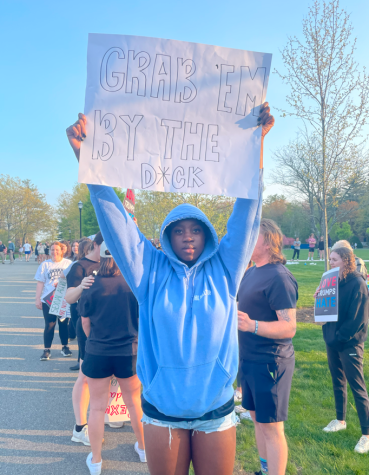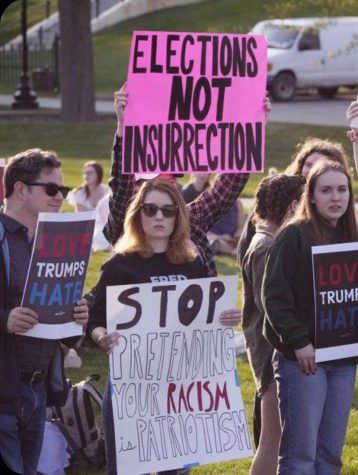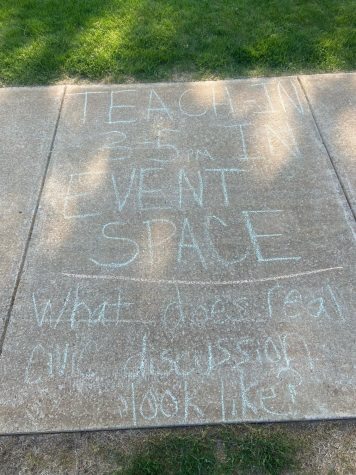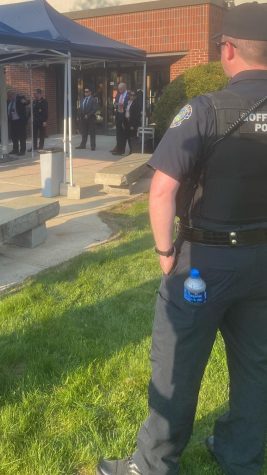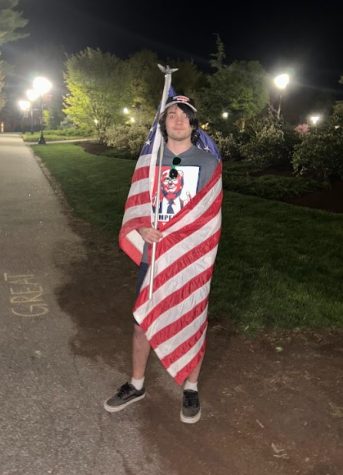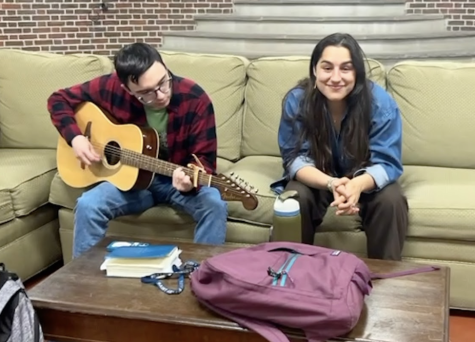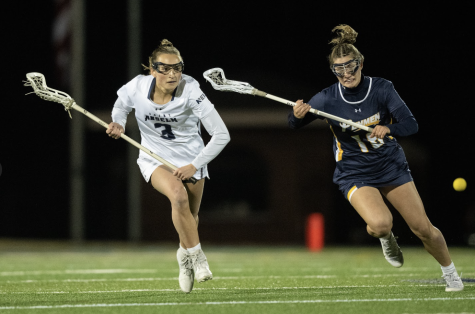TEDA panel invites community to ‘listen, learn and engage’
April 3, 2023
A panel of LGBTQ+ students was hosted by TEDA, the True Equality and Dignity Alliance, in the LLC classroom on Tuesday, March 28. Students, faculty, members of administration, and the monastic community attended. The panel was moderated by Wayne Currie, director of the Intercultural Center. As stated by TEDA president Gabby Stornaielo, the panel’s purpose was “to make the ‘other’ familiar with our community.”
Prof. Banach, TEDA advisor, said that, “The most powerful way of changing the climate on campus is to let people see we [LGBTQ+ people] are really human beings.” The panel is one of the oldest TEDA traditions and has been held for about 5 years.
Panelists were first asked about their level of comfort on campus as LGBTQ+ students. A freshman on the panel stated that before coming to college she was unsure how the Catholic community and the queer community intersected on campus. She referenced positive experiences in the Intercultural Center and Campus Ministry that have helped her feel safe.
Asher Manning ‘25 described his experience as a transgender student as “tumultuous,” and said, “Apparently my existence simply bothers [some people].” A panelist described their experience of going into every interaction on campus with the default expectation of being rejected for their queerness. Another panelist found that many people didn’t understand why the f-slur is offensive and that she had to explain the history of the term to them.
Panelists also described positive experiences on campus. All panelists referenced their friends as some of their strongest sources of support and acceptance. Rina Simpson ‘23 said, “If you told me four years ago that I would be fully out on this campus, I would have said you’re crazy.”
A panelist said that “my comfortability has to do with my own level of self-acceptance,” and said that her friends were a crucial support in this.
The Transitions program and the Academic Resource Center were mentioned as significant sources of support for LGBTQ+ students. Professors who invite students to share pronouns and who are outwardly supportive in other ways also contribute to students’ sense of safety on campus.
The panel was next asked, “What is something you would want Anselmians to know about being a LGBTQ+ identifying student on campus?” Manning answered, “If an LGBTQ+ person shares their story with you, it means they trust you to not use that information against them.”
Another panelist said that she would simply want others to know that college is intimidating enough as it is and that “we [queer students] are here to learn too.” Another panelist answered that “Being queer is an important part of my identity, but not all of my identity.”
A panelist wanted listeners to know that the concerns raised by LGBTQ+ students are not simply hypothetical issues, they are practical safety concerns. This panelist shared a personal story which drove home the importance of LGBTQ+ affirming spaces on campus.
She shared that her process of coming out to herself was “tumultuous,” and described a growing feeling that she didn’t belong in the faith community that was so important to her. The panelist said, “First, I want to put a trigger warning on this.” She listed several incidents targeting LGBTQ+ students on campus and said that these incidents with no administrative response only contributed to the message she was receiving of “you don’t belong here.” She said, “I didn’t see a way forward that was a life worth living. That message was my breaking point,” and she decided to attempt to take her own life. She was grateful to be present at the panel to tell her story, but she stated that she wants College administration to be aware of the weight of their responsibility to actively create an affirming, safe campus for all students.
Manning emphasized this as well, stating that he “lost all trust in the RA program,” after a student who sprinkled salt on the quad in an act of ritual purification after 2022’s Visibility Day was allowed to remain an RA. Manning shared the other panelist’s experience of lacking reliable support from the College in moments of crisis.
Following up on the last question, panelists expressed the questions that they would ask the College. Manning asked, “Why, in the student handbook, is there no protection for us?” Another panelist asked, “Are teachers aware when students are being treated hatefully and do they do anything?”
Prof. Banach stated, “You can disagree with someone, but we don’t question the right of those people to exist. Queer students should not be different.” The panel was a concrete reminder that queer students on the College’s campus do exist, and Banach hopes the community will “welcome them as we’re supposed to welcome Christ.”




